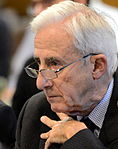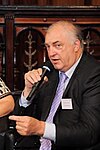
General elections were held in Luxembourg on 13 June 2004, alongside European Parliament elections. The ruling Christian Social People's Party (CSV) of Prime Minister Jean-Claude Juncker won the election, increasing its number of seats to its highest since before 1989 and its share of the vote to levels not seen since the 1959 election.

General elections were held in Luxembourg on 13 June 1999, alongside European Parliament elections. The Christian Social People's Party remained the largest party, winning 19 of the 60 seats in the Chamber of Deputies. It formed a coalition government with the Democratic Party.

General elections were held in Luxembourg on 12 June 1994, alongside European Parliament elections. The Christian Social People's Party remained the largest party, winning 21 of the 60 seats in the Chamber of Deputies. It continued the coalition government with the Luxembourg Socialist Workers' Party.
General elections were held in Luxembourg on 26 October 1919. They were the first held after several constitutional amendments were passed on 15 May of the same year. The reforms had introduced universal suffrage and proportional representation, increased the electorate from 6% of the population to 42%, and vested national sovereignty in the people, as opposed to the Grand Duke. They were also the first elections held after the German occupation during World War I.
General elections were held in Luxembourg on 21 October 1945. They were the first elections held after the German occupation during World War II. As a result of the war, the political alliances of the interwar period had been ended. In their place were new parties; the Christian Social People's Party, the Luxembourg Socialist Workers' Party, and the Patriotic and Democratic Group in place of the Party of the Right, Socialist Party, and Radical Liberal Party respectively. It is regarded as a realigning election, as the election established the party political order, with four established parties, that would be maintained until 1974.
General elections were held in Luxembourg on 30 May 1954. The Christian Social People's Party won 26 of the 52 seats in the Chamber of Deputies.
General elections were held in Luxembourg on 1 February 1959. The Christian Social People's Party remained the largest party, winning 21 of the 52 seats in the Chamber of Deputies.
General elections were held in Luxembourg on 7 June 1964. Despite receiving fewer votes than the Luxembourg Socialist Workers' Party, the Christian Social People's Party remained the largest party, winning 22 of the 56 seats in the Chamber of Deputies.
General elections were held in Luxembourg on 15 December 1968. The Christian Social People's Party (CSV) remained the largest party, winning 21 of the 56 seats in the Chamber of Deputies.
General elections were held in Luxembourg on 26 May 1974. The Christian Social People's Party remained the largest party, winning 18 of the 59 seats in the Chamber of Deputies. However, it went into opposition as the Luxembourg Socialist Workers' Party and Democratic Party formed a coalition government under prime minister Gaston Thorn.
General elections were held in Luxembourg on 10 June 1979. The Christian Social People's Party remained the largest party, winning 24 of the 59 seats in the Chamber of Deputies. After spending the previous four years in opposition, it returned to government in coalition with the Democratic Party, resulting in the Werner-Thorn Ministry.

General elections were held in Luxembourg on 17 June 1984. The Christian Social People's Party remained the largest party, winning 25 of the 64 seats in the Chamber of Deputies. It formed a coalition government with the Luxembourg Socialist Workers' Party, the Santer-Poos government.
Partial general elections were held in Luxembourg on 28 May 1922, electing 25 of the 48 seats in the Chamber of Deputies in the centre and north of the country. The Party of the Right won 13 of the 25 seats, but saw its total number of seats fall from 27 to 26.
General elections were held in Luxembourg on 1 March 1925. The Party of the Right won 22 of the 47 seats in the Chamber of Deputies.
Partial general elections were held in Luxembourg on 3 June 1951, electing 26 of the 52 seats in the Chamber of Deputies in the south and east of the country. The Christian Social People's Party won 12 of the 26 seats, but saw its total number of seats fall from 22 to 21.
Partial general elections were held in Luxembourg on 3 June 1928, electing 28 of the 52 seats in the Chamber of Deputies in the south and east of the country. The Party of the Right won 13 of the 28 seats, and saw its total number of seats rise from 22 to 24.
Partial general elections were held in Luxembourg on 7 June 1931, electing 25 of the 54 seats in the Chamber of Deputies in the centre and north of the country, as well as two seats in the south. The Party of the Right won 14 of the 27 seats, and saw its total number of seats rise from 24 to 26.
Partial general elections were held in Luxembourg on 3 June 1934, electing 29 of the 54 seats in the Chamber of Deputies in the south and east of the country. The Party of the Right won 12 of the 29 seats, but saw its total number of seats fall from 26 to 25.
Partial general elections were held in Luxembourg on 6 June 1937, electing 26 of the 55 seats in the Chamber of Deputies in the centre and north of the country. The Party of the Right won 13 of the 26 seats and remained the largest party with 25 of the 55 seats.
Partial general elections were held in Luxembourg on 6 June 1948, electing 26 of the 51 seats in the Chamber of Deputies in the centre and north of the country. The Christian Social People's Party won 9 of the 26 seats, reducing its total number of seats from 25 to 22.








